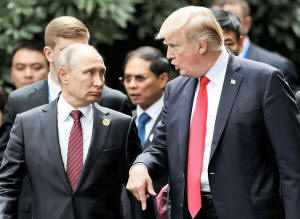|
As Trump says Putin 'not my enemy',
skeptics in U.S. see danger
 Send a link to a friend
Send a link to a friend
 [July 13, 2018]
By Patricia Zengerle and John Walcott [July 13, 2018]
By Patricia Zengerle and John Walcott
WASHINGTON (Reuters) - In preparing for his
first summit with Russian President Vladimir Putin, U.S. President
Donald Trump has provoked a rare agreement among Democrats and
Republicans alarmed by the possibility of a cozy meeting.
While Republican Trump has gone softer on Putin, calling him a
"competitor" and "not my enemy" on Thursday, lawmakers from both parties
hardened their warnings to Trump before he sits down with the Russian
leader in Helsinki on Monday.
"Putin is not America's friend, nor merely a competitor. Putin is
America's enemy — not because we wish it so, but because he has chosen
to be," Republican Senator John McCain said.
"It is up to President Trump to hold Putin accountable for his actions
during the meeting in Helsinki," McCain said in a statement. "Failure to
do so would be a serious indictment of his stewardship of American
leadership in the world.”
Trump has touted the summit as an opportunity to reduce tensions,
inflamed by Russia's annexation of the Crimea peninsula from Ukraine in
2014, its military backing of Syrian President Bashar al-Assad, which
turned the tide of the Syrian civil war in 2015, and accusations of
Russian meddling in the 2016 U.S. election.

U.S. lawmakers want Trump, both privately with Putin and publicly, to
condemn Russia's actions.
Congress has taken a hard anti-Russia stance, nearly unanimously
approving last year a tough sanctions law targeting Moscow. But
lawmakers worry Trump will fail to take Putin to task, particularly over
the election meddling, which the Russian leader has denied.
U.S. intelligence agencies concluded that Moscow interfered and Trump
has said he would discuss it, although he has stated both a willingness
to believe Putin's denials and U.S. agencies. Trump has described a
special counsel investigation into possible collusion between Trump
campaign aides and Russia as a political witch hunt.
"Our goal must be to demonstrate to the world that the community of
democratic nations does not intend to accede to Putin's or any other
authoritarian's view of the world. We will resist Russia's aggression,"
Democratic Senator Mark Warner and Republican Senator Marco Rubio said
in an op-ed in USA Today on Thursday.
Senior Trump administration officials also have voiced fears about what
he might give Putin to the detriment of allies in Europe, especially
after seeing how Trump appeared to get only vague commitments from North
Korean leader Kim Jong Un at their June 12 summit in Singapore to
discuss denuclearization.
Trump declared that he had ended the nuclear threat from North Korea,
but one senior U.S. official, speaking on the condition of anonymity,
said: "Who's to say he won’t come out of Helsinki saying he and Putin
agreed that Russia no longer poses a threat to the rest of Europe?"

[to top of second column]
|

President Donald Trump and Russia's President Vladimir Putin talk
during the family photo session at the APEC Summit in Danang,
Vietnam November 11, 2017. REUTERS/Jorge Silva/File Photo

'EASIEST' PART OF TRUMP TRIP
Worries over Trump's commitment to European allies and his deference to
Russia loomed large at the NATO summit that wrapped up on Thursday.
Trump claimed a personal victory after telling European allies to
increase their defense spending or lose Washington's support. He
particularly railed against Germany and Chancellor Angela Merkel.
Trump took another swipe at U.S. allies when he told reporters in
Brussels that he thought his meeting with Putin would be "the
easiest" part of his week-long European trip.
U.S. Senator Jeff Flake, a Republican, criticized Trump for saying
that.
"The Russian president is a man schooled in treachery and espionage.
He jails and murders his opponents, presides over a mafia state and
he is an enemy of democracy. Why would a meeting with Putin be
easier than a meeting with the allies that we rely on most to be a
bulwark against him?" Flake asked in a Senate speech.
Putin won re-election for six more years in March with opposition
leader Alexei Navalny barred from running on what he says was a
false pretext.
Europeans and some U.S. officials are particularly concerned about
whether Putin will ask Trump to suspend NATO military drills in the
Baltic states on Russia's doorstep.
Another senior U.S. official said that if Putin came away from the
meeting with Trump thinking he had permission to act in the Baltics,
Estonia might become the epicenter of what NATO has helped to
prevent.
Trump's assertion that Russia is a competitor and not an adversary
is contrary to the judgments of U.S. intelligence agencies and his
chief diplomat, Mike Pompeo, who at his April confirmation hearing
to be Secretary of State, said the United States needs "to push back
in each place we confront them," referring to the Russians.

While Trump said on Thursday that he expects the Helsinki summit to
be "just a loose meeting," some at home are hoping it will be a
"non-event" with nothing groundbreaking.
"Based on just the way things are shaping up, I think a non-eventful
Helsinki meeting might be best for our country," Republican Senator
Bob Corker, chairman of the Foreign Relations committee, told
Reuters.
(Reporting by Patricia Zengerle and John Walcott; Additional
reporting by Jonathan Landay and Arshad Mohammed; Writing by Mary
Milliken; editing by Grant McCool)
[© 2018 Thomson Reuters. All rights
reserved.]
Copyright 2018 Reuters. All rights reserved. This material may not be published,
broadcast, rewritten or redistributed.
Thompson Reuters is solely responsible for this content. |